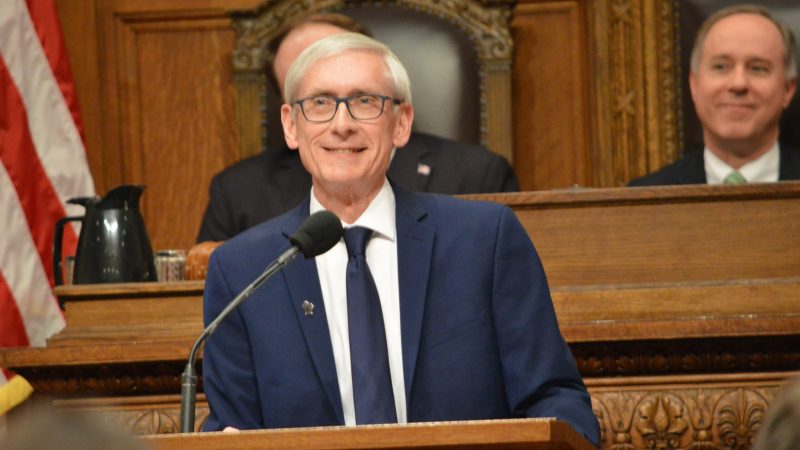In his second State of the State, Gov. Tony Evers will challenge lawmakers to address a series of issues before they adjourn from the session, including nonpartisan redistricting, capping the cost of insulin and getting PFAS “out of our water.”
Evers’ office released excerpts of what he will say ahead of the speech. They included a list of priorities that include investing in rural communities, addressing youth vaping and closing the so-called “dark store loophole.”
But several of those have been nonstarters with the GOP-controlled state Legislature. Republican leaders have rebuffed attempts to bring the dark-store bills to the floor in either house, though there is some support in each GOP caucus for the bills. Assembly Speaker Robin Vos, R-Rochester, yesterday knocked Evers on his call to address youth vaping, saying the guv had failed to reach out to GOP lawmakers ahead of his announcement over the weekend of new initiatives.
And GOP leaders have dismissed calls for nonpartisan redistricting, saying they don’t trust unelected bureaucrats to draw the state’s political boundaries.
>> WisPolitics is now on the State Affairs network. Get custom keyword notifications, bill tracking and all WisPolitics content. Get the app or access via desktop.
The Dem guv’s call comes as GOP leaders have indicated they plan to wrap up their work for the session within weeks. Senate Majority Scott Fitzgerald, R-Juneau, said yesterday his chamber will be on the floor Feb. 19 and likely one day in March before adjourning. The Assembly is expected to finish its work for the year by the end of February.
Still, Evers also plans to push for making higher education more affordable and addressing student loan debt, which he says is preventing people from buying cars, starting businesses and starting families.
“There’s no rest for the elected, folks, and we’ve got a lot to get done before anyone takes a vacation,” Evers will say, according to the excerpts.
GOP leadership this afternoon portrayed the Evers administration as playing politics while the Legislature has focused on bipartisan bills.
“Contrary to what administration might believe, we haven’t been waiting for a homework assignment,” said Assembly Majority Leader Rep. Jim Steineke, R-Kaukauna, referencing a letter the guv sent lawmakers earlier this year with a list of “homework.”
Evers’ speech comes after a year in which he was often at odds with GOP legislative leaders. The year was marked by lawsuits over the actions Republicans took in a December 2018 lame-duck session to reign in the powers of Evers and AG Josh Kaul before they took office.
There were also regular spats between the legislative branch and East Wing that were both over substance and style. Republicans also nixed many of Evers’ priorities in the state budget and quickly gaveled in and out a special session he called to address new gun laws, decrying the proposals as an infringement on the Second Amendment.
Evers will acknowledge the “setbacks and occasional political posturing” during his first year, likening them to “huffing and puffing.”
But he will tout executive orders he signed “affirming equity, inclusion, respect, and dignity for state workers in Wisconsin.” Evers also will point to his work delivering on a campaign promise to reinstate the pardon review board, which resulted in the first pardons issued in the state in nine years.
Assembly Speaker Robin Vos, R-Rochester, insisted the 2018 extraordinary session actually helped foster bipartisanship by making the Legislature more of an equal with the executive branch.
Vos said he believed the 2018 lame-duck session limiting the guv’s power helped with bipartisanship because “it allowed the Legislature to be stronger” in divided government. He also defined “bipartisanship” as cooperation between two major political parties and said Evers has focused more on poll results than working with lawmakers.
“Bipartisanship requires actual compromise and not just empty rhetoric that we could potentially hear tonight,” Vos said.



